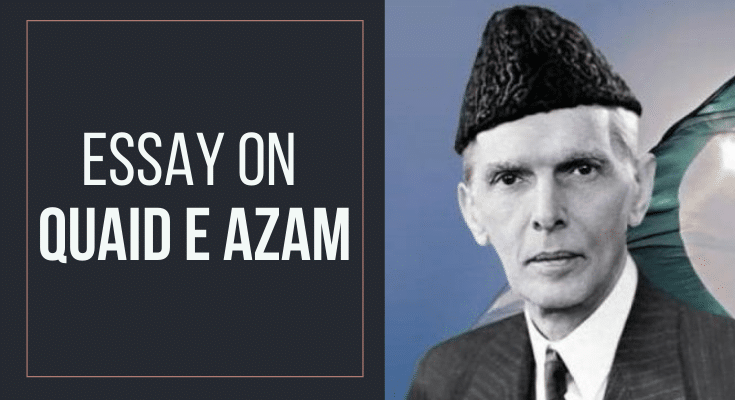Quaid-e-Azam essay: Quaid-e-Azam, also known as Muhammad Ali Jinnah, was a pivotal figure in the creation of Pakistan as an independent Muslim state. He served as the country’s first Governor-General and played a crucial role in the negotiations for Pakistan’s independence from British rule.
Quaid-e-Azam essay

Muhammad Ali Jinnah, also known as Quaid-e-Azam, was a lawyer, politician, and the founder of Pakistan. He is revered in Pakistan as its national hero and is considered one of the country’s greatest leaders.
Jinnah was born in Karachi, British India, in 1876. He received his early education at the Sindh
Madrasa-Tul-Islam and later studied law at Lincoln’s Inn in London. He began his career as a
lawyer and quickly gained a reputation for his exceptional legal skills. In 1906, he joined the
Indian National Congress, a political party that was campaigning for Indian independence from British rule.
However, Jinnah eventually became disillusioned with Congress and its inability to address
the grievances of Muslims in India. He believed that Hindus and Muslims were two separate
nations with their own distinct cultures and religions and that they could not coexist peacefully within a single political entity.
In 1940, Jinnah founded the All India Muslim League, a political party that fought for the rights of Muslims in India and eventually became the driving force behind the creation of Pakistan. He became known as Quaid-e-Azam, or “Great Leader,” and led the League to victory in the
elections of 1946.
On August 14, 1947, Pakistan became an independent country, and Jinnah was appointed as its first Governor-General. He worked tirelessly to build the new nation and establish it as a
modern, democratic, and progressive state. He also sought to improve relations with other
countries and to promote a peaceful resolution to the Kashmir conflict with India.
Jinnah’s leadership and vision played a crucial role in the creation and development of Pakistan.
He is remembered as a brilliant and courageous leader who fought for the rights of Muslims in India and played a key role in the creation of an independent Muslim state.
Despite his many accomplishments, Jinnah’s legacy is not without controversy. Some have
criticized his decision to partition India and create Pakistan, arguing that it led to widespread
violence and the displacement of millions of people. Others have accused him of being
autocratic and not fully committed to democracy.
However, these criticisms must be viewed in the context of the time in which Jinnah lived. He
was dealing with a complex and volatile political situation, and he had to make difficult decisions that would shape the future of his country. It is clear that he was motivated by a deep sense of patriotism and a desire to create a better future for the people of Pakistan.
In conclusion, Muhammad Ali Jinnah, also known as Quaid-e-Azam, was a remarkable leader
who played a crucial role in the creation and development of Pakistan. He was a brilliant lawyer, a skilled politician, and a visionary leader who fought for the rights of Muslims in India and worked tirelessly to build a strong and prosperous nation. Despite the controversy surrounding his legacy, he remains an important figure in the history of Pakistan and is revered as a national hero by many.
